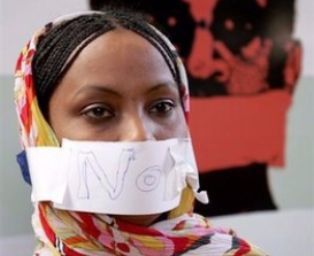Sudanese journalists welcome lifting of press gag
By Muhammad Osman
August 8, 2010 (KHARTOUM) – A Sudanese journalist and a local watchdog of press freedom have welcomed the decision of the Sudanese authorities to lift pre-publication censorship against local newspapers but they both expected the practice to make a comeback soon.

The system of pre-publication censorship, under which NISS agents visit offices of newspapers at night to screen copies prior to publications and expunge contents deemed controversial, has been practiced on and off since February 2008.
Describing the system, the acting editor-in-chief of Ajrass al-Hurriyah newspaper, Faiz al-Silaik, told the New York-based Committee to Protect Journalists (CPJ) on June 7 that “in Sudan, the security officer is the editor-in-chief. He decides what runs in the paper and what doesn’t.”
NISS’s Director-General Moahmed Atta announced on 06 August, according to the state-run Sudan Media Center (SMC), that censorship would be terminated “after the reasons that necessitated it have disappeared”
Mohamed Atta explained that those reasons were “erroneous reporting by some papers on Sudan’s relations with neighboring countries as well as calls for separation, incitement of sedition and tribal sentiments.”
However, SMC quoted the head of the NISS’s media department as saying that the NISS “reserves its constitutional right to re-impose partial or complete censorship whenever the necessity to do so arises,”
“Censorship is unconstitutional and illegal to begin with” says Amar Awad, who heads the freedoms committee of the Sudanese Journalists Network (SJN), a local group of journalists dedicated to defending press freedom, in response to the NISS’s claims of “a constitutional right” to impose censorship.
Awad told Sudan Tribune yesterday that “press freedom is not a grant by the NISS, it is our right and that right has been given back to us”
“We welcome the decision but we also think it is incomplete in view of the fact that there are still newspapers under suspension and journalists in prison.” Amar added.
His remarks refer to the case of Ra’y al-Sha’b newspaper which was shut down in May for publishing a report alleging that members of Iran’s Revolutionary Guards had set up a weapons factory in Khartoum to manufacture arms intended to be supplied to Islamists in Somalia and Hamas movement. Three of the paper’s journalists were arrested, reportedly tortured and put on trial. On July 15, the three journalists received prison sentences ranging from two to five years.
Awad opined that “censorship could still return at any point, which makes this move even more incomplete”, calling on the NISS “refrains from its attempts to curtail freedoms and subjugate chief editors through financial constraints”
“It is a mistake that has been corrected” says the managing editor of Al-Ahdath daily newspaper, Osman Fadul Allah, about the decision to cease censorship. “But the mistake could be made again” he adds.
Speaking to Sudan Tribune yesterday, Osman said that “as long as the government can’t stomach and respect the role of the press and as long as some of those in the government continue to view the press as their enemy, the specter of censorship will remain hanging over the heads of Sudanese journalists”
Sudan stepped up censorship in February 2008 after some journalists excoriated the government for backing a failed putsch by Chadian rebels to storm the capital Ndjamena and overthrow President Deby.
The practice was suspended in October 20 as the country was approaching national elections in April 2010 and after chief editors of newspapers were forced to sign a journalistic code of honor obliging them to refrain from the publication of any content that crosses red-lines. These red-lines, in the words of President Al-Bashir, are anything “destructive to the nation, sovereignty, security, values and morality.”
But censorship made a comeback last June, less than two months after the country held national elections which were supposed to herald an ear of democratic transformation.
Press censorship has forced many papers, especially those critical of the government, to suspend publication on numerous occasions. In November 2008, Sudanese authorities arrested over 70 journalists who demonstrated outside the national parliament to protest against press censorship.
Reporters Without Borders ranked Sudan as number 148 in its 2009’s World Press Freedom Index.
(ST)

DASODIKO
Sudanese journalists welcome lifting of press gag
This is a forth welcoming, and will reach to number tenth. If the media write about ICC also they will be censored and journalists be arrested or harrassed. Let us wait ans see. Ass I use to say always these guys can’t live under free democratic environment; because their ideology is based on violent. The Islamists say a governemnt without scaring people is like a lion without teeth.